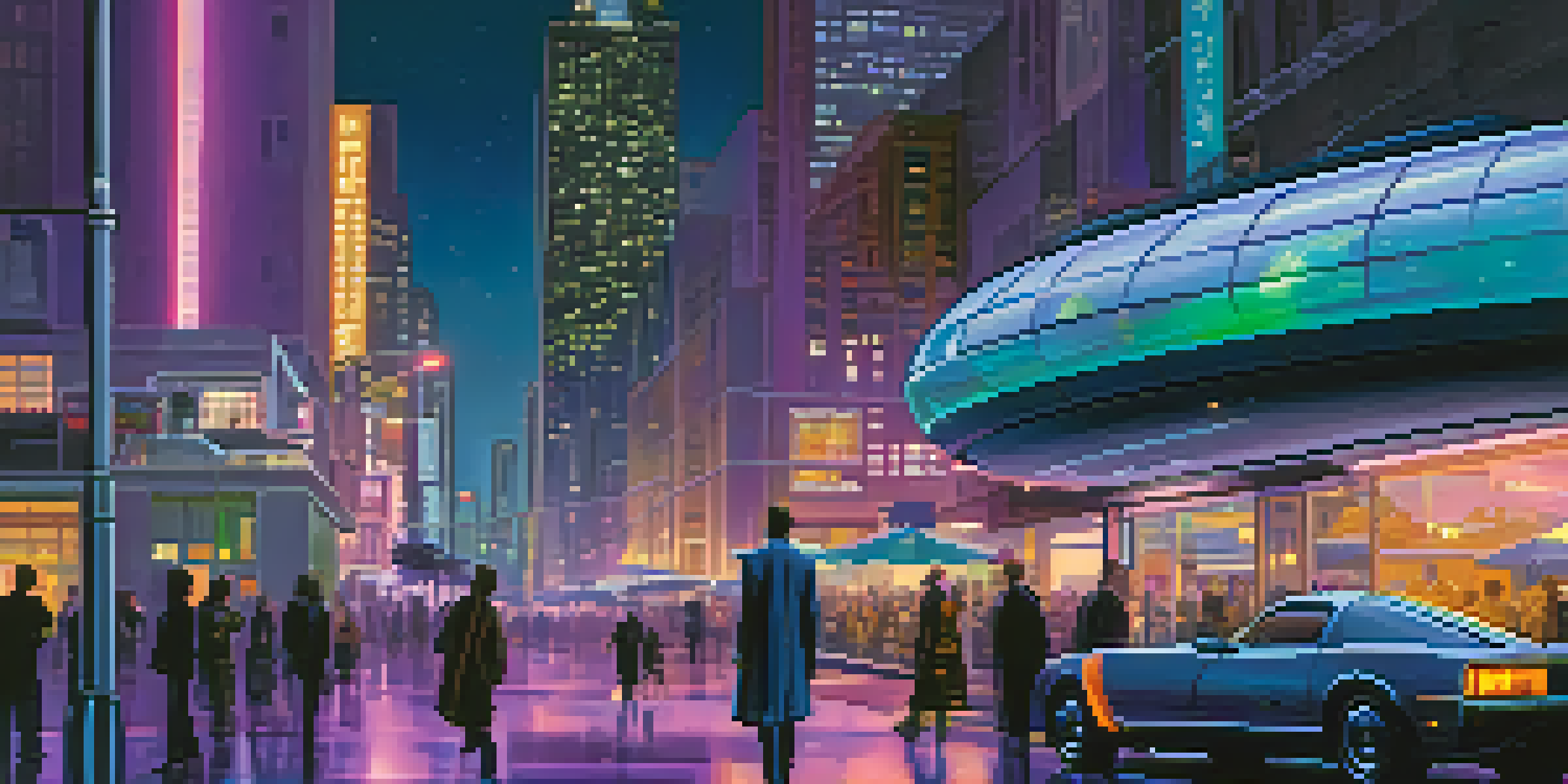Time Travel in Cinema: Scientific Concepts vs. Hollywood Fantasy

Understanding Time Travel: A Scientific Perspective
Time travel has fascinated humanity for centuries, blending science with imagination. At its core, time travel involves moving between different points in time, similar to how we navigate through space. Scientists often reference theories like Einstein's relativity, which suggests that time is not a fixed entity but can be manipulated under certain conditions. This scientific foundation provides a tantalizing backdrop for filmmakers who seek to explore the possibilities of time travel.
The future is already here — it's just not very evenly distributed.
While theoretical physics discusses concepts like wormholes and time dilation, these ideas often remain abstract for the average viewer. In cinema, these complex theories are simplified to create engaging narratives that captivate audiences. For instance, movies like 'Interstellar' illustrate how gravitational forces can affect the passage of time, offering a visually stunning representation of scientific principles. This blend of science and storytelling allows viewers to ponder the implications of time travel while being entertained.
However, the question remains: how accurately does cinema portray these scientific concepts? Often, filmmakers prioritize narrative over scientific accuracy, leading to fantastical interpretations. This tension between real science and creative storytelling is what makes time travel films so intriguing, inviting audiences to explore the boundaries of possibility.
Hollywood's Creative License: Fantasy vs. Reality
Hollywood is known for its creative flair, and when it comes to time travel, filmmakers often take significant liberties with scientific accuracy. Classic examples like 'Back to the Future' present time machines that operate on whimsical principles, such as a DeLorean powered by a flux capacitor. While entertaining, these concepts stretch the limits of scientific credibility, focusing instead on plot dynamics and character development.

This creative license allows filmmakers to craft compelling stories that resonate with audiences on an emotional level. For instance, 'The Time Traveler's Wife' explores the personal struggles of its characters rather than the mechanics of time travel itself. By prioritizing emotional depth over scientific realism, the film invites viewers to connect with the characters' journeys, making the experience relatable and impactful.
Time Travel Blends Science and Art
Filmmakers often mix scientific theories with creative storytelling to engage audiences while exploring the concept of time travel.
Such artistic choices raise an interesting dialogue about the role of science in storytelling. While some viewers may crave scientific accuracy, others appreciate the imaginative freedom that fantasy offers. This dichotomy highlights the diverse ways audiences engage with time travel narratives, reminding us that sometimes, it's not just about the science—it's about the story.
Famous Time Travel Movies: Blending Science with Fiction
Numerous time travel films have left an indelible mark on cinema, each offering a unique interpretation of the concept. Movies like '12 Monkeys' delve into themes of fate and causality, presenting a darker, more complex view of time travel. Here, the narrative challenges viewers to consider how small actions can have monumental consequences, echoing real-life philosophical debates about determinism versus free will.
Time is a created thing. To say 'I don't have time,' is like saying, 'I don't want to.'
In contrast, films like 'Looper' play with the idea of alternate timelines, suggesting that time travel creates branching realities. This concept, while rooted in theoretical physics, is often portrayed in ways that prioritize action and suspense over strict adherence to scientific principles. By crafting narratives around these imaginative frameworks, filmmakers invite audiences to ponder the ethical implications of manipulating time.
Ultimately, these films serve as a reflection of societal values and concerns, using time travel as a vehicle to explore complex themes. Whether it's examining the repercussions of one's actions or grappling with the paradoxes that arise, these stories resonate deeply with viewers, highlighting the timeless allure of time travel in cinema.
The Science Behind Time Travel: Real or Theoretical?
As viewers, we often wonder how much of what we see in films is grounded in real science. The truth is, while time travel remains largely theoretical, some scientific principles lend themselves to cinematic interpretation. For instance, the concept of wormholes proposes shortcuts through space-time, allowing for potential time travel. However, these ideas are still in the realm of speculation and have not yet been proven or achieved.
Despite the limitations of current scientific understanding, filmmakers often incorporate these theories to add a layer of authenticity to their narratives. Movies like 'The Terminator' utilize time travel as a plot device, but they also spark curiosity about the implications of technology and artificial intelligence. This blend of science fiction and cautionary tale allows viewers to engage with real-world issues through the lens of time travel.
Hollywood's Creative License
Time travel films frequently prioritize emotional narratives over scientific accuracy, allowing for imaginative storytelling that resonates with viewers.
By examining the intersection of science and cinema, we can better appreciate the creative choices filmmakers make. While they may not always adhere strictly to scientific principles, these choices often serve a greater narrative purpose, inviting audiences to explore complex ideas in an accessible and entertaining way.
Cultural Impact: How Time Travel Films Shape Our Perception
Time travel films have significantly influenced popular culture, shaping how we think about time, fate, and our choices. They often reflect societal anxieties and aspirations, allowing audiences to explore 'what if' scenarios. For instance, 'Groundhog Day' presents a unique take on time loops, encouraging viewers to consider the value of self-improvement and personal growth. This blend of humor and philosophy resonates deeply, making the concept of time travel relatable.
Moreover, these films often spark discussions about the nature of existence and the human experience. By presenting time as a malleable construct, filmmakers invite us to reflect on our lives and the impact of our decisions. This introspection can lead to a deeper understanding of ourselves and our relationships, showcasing the profound effect cinema can have on our worldview.
Ultimately, the cultural impact of time travel films extends beyond entertainment; they serve as a mirror reflecting our hopes, fears, and desires. Through engaging narratives and imaginative storytelling, these films challenge us to think critically about the passage of time and our place within it.
The Future of Time Travel in Film: Trends and Innovations
As technology advances, the potential for new storytelling techniques in time travel films continues to grow. Virtual reality and augmented reality offer filmmakers exciting tools to create immersive experiences, allowing audiences to feel as if they are stepping into different timelines. This innovation could revolutionize how time travel narratives are experienced, providing a deeper connection between viewers and the story.
Additionally, the rise of streaming platforms has allowed for more diverse storytelling. Series like 'Dark' and 'The Umbrella Academy' explore complex time travel concepts over multiple episodes, offering a deeper exploration of characters and plotlines. This serialized format allows for nuanced storytelling that can delve into the intricacies of time travel, attracting viewers who crave complexity and depth.
Cultural Reflections in Time Travel
These films serve as a mirror to societal values, prompting discussions about choices and existence through engaging 'what if' scenarios.
In this ever-evolving landscape, the future of time travel in cinema is bright. As filmmakers continue to push boundaries and explore new technologies, we can expect fresh interpretations that challenge our understanding of time and reality. This evolution promises to keep audiences engaged and excited about the possibilities that lie ahead.
Conclusion: The Enduring Fascination with Time Travel
Time travel remains one of the most captivating concepts in cinema, blending scientific intrigue with imaginative storytelling. As we’ve seen, filmmakers often walk a fine line between accuracy and fantasy, creating narratives that resonate on multiple levels. Whether through emotional exploration or philosophical inquiry, time travel films invite audiences to reflect on their lives and choices.
As technology advances and storytelling techniques evolve, the potential for new and exciting time travel narratives is limitless. From blockbuster films to thought-provoking series, each interpretation invites us to ponder the implications of time travel and its impact on our understanding of the world. This ever-expanding genre continues to challenge our perceptions and spark our imaginations.

In the end, the allure of time travel in cinema lies in its ability to provoke thought and inspire curiosity. As we navigate through our own timelines, these stories remind us of the power of choice and the beauty of possibility.